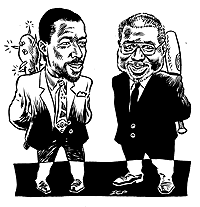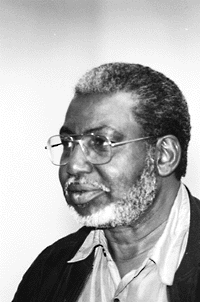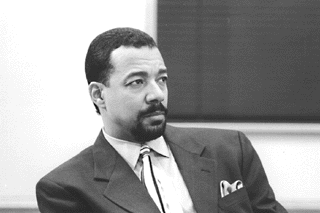https://www.austinchronicle.com/news/1997-05-30/528303/
BloodSport
Place 6 Goes for the Jugular
By Kayte VanScoy, May 30, 1997, News
|
|
Despite Mitchell's call for a discussion of the issues, voters might well be wondering what concerns drove either Eric Mitchell or Willie Lewis to run for Place 6, since neither has addressed a substantive issue in weeks. After attack and counterattack from both sides in print, radio, television and, perhaps eventually, through their lawyers, the only issue left worth discussing is which campaign's tactics will end up disgusting the voters more. Still, Lewis may actually be taking the higher road. After all, while Mitchell's minions make personal slams, Lewis' attacks are based directly on Mitchell's job performance.
After sleepwalking through the general election, Mitchell's campaign only began playing hardball after election results showed that he and Lewis were neck-and-neck. "I don't think he was expecting to end up in a runoff, frankly," says political consultant Don Martin, adding that a disillusioned Mitchell, who had not hired on any professional advisors the first time around, phoned up Martin for advice the day after the May 3 general election. Lewis, on the other hand, well-padded since the beginning by a cadre of progressive spin doctors, is finally on nearly even footing with Mitchell thanks to the beefed-up financial muscle of his runoff campaign. After Lewis had endured weeks of Mitchell's minions' successful whisper campaign on the rumor mill of Austin's talk radio circuit, Mitchell finally put his money where his mouth is -- and the Lewis camp was primed to respond.
She Said, He Said
|
|
Supposedly backing up Turner's claims are two letters which have been continuously cited on both KAZI and KVET as if they were sacred covenants instead of possibly politically motivated smears. One letter is from Janice Brown, a former tenant of Lewis' who currently works for Armstrong McCall Beauty Supply. The letter begins "Because I would not have sex with Willie Lewis, me and my three babies were put out of our home." Upon further questioning, however, Brown contradicts her own letter, admitting that Lewis never actually propositioned her, and that she was not evicted, but rather, she left voluntarily. However, Brown does continue to assert that she left because Lewis' unwanted advances made her uncomfortable. "He never really touched me," Brown says, adding that Lewis backed off after her boyfriend read him the riot act.
For his part Lewis flatly denies all of Brown's charges, though he acknowledges knowing her as a former tenant. In fact, he successfully sued her for $729 worth of damages to his property, which she is still paying back four years later. Lewis' campaign manager, Todd Main, notes that the judgment levied against Brown gives her ample motivation to crush Lewis' political aspirations.
The second letter was written by Charmaine Swisher, a secretary for Carmen & Bowden Survey Company, and has been fodder for the overactive imaginations at KVET and KAZI for weeks. Neither Swisher, the Mitchell campaign, nor KVET would release Swisher's letter to the Chronicle, but before abruptly hanging up on this reporter, Swisher did agree to detail her accusations over the phone. Swisher, who admits to being "in recovery" herself, summarizes her own letter as follows: Lewis "likes to get women that are strung out on drugs and get them to do sexual acts on him and he would repay them with drugs." Swisher initially said that two to three years ago, Lewis would often pay her to drive her crack-addicted sister and a friend to a hotel where she would watch the women have sex with Lewis in exchange for crack, or money to buy crack. A few hours after making these statements, however, Swisher changed her story and said the events in question actually occurred four years ago and that her sister only met Lewis for sex once or twice. She then retracted her statement about witnessing sex acts, and said that she had merely dropped her sister off at the hotel to meet Lewis. When pressed for details such as which hotel, the color of Lewis' car, or the documented proof which Swisher says she has, Swisher launched into a tirade -- "Are you going to help these girls or are you just interested in Willie Lewis?" -- and hurriedly slammed down the phone.
Lewis is dumbfounded by Swisher's charges. "This is the most ridiculous thing that I have ever heard," he said, giggling with embarrassment over the allegations of group sex. "I've never heard of that before. I'm not that freakish." Lewis adds that he has a "negative tolerance for drugs" and is particularly disgusted by the accusations linking him to drug use.
For his part, Mitchell is quick to distance himself from the sex-and-drugs rumor mill working overtime on Lewis. "I've had absolutely nothing to do with it; I received a package [of letters] just like everyone else, and I refused to use it," Mitchell says.
Finally, after weeks of Sammy and Bob whipping themselves into a pro-Mitchell frenzy over the letters, a May 19 caller to their radio show asked that KVET focus on issues rather than mud-slinging. Sammy quickly shot back: "The issue is, is [Lewis] a child molester, and did he trade drugs for sex?" Whoops. Obviously poor Sammy had been confused by Turner's haranguing phone calls to the show which usually focused on the experiences of her own crack-addicted daughter and what she calls "enabling old men," presumably men such as Lewis.
Not only does nothing in Brown's or Swisher's already questionable claims point to child molestation, but apparently Sammy and Bob had nothing besides the letters waiting in the wings to back up their name-calling. Lewis's lawyers immediately issued KVET a letter demanding a retraction, to which KVET responded by asking for a release of liability which would, in exchange for their retraction, clear KVET of any libel charges. Unfortunately for KVET, it had very little room to be making requests. When the Lewis camp declined to sign away its right to sue, KVET aired a full retraction and an apology anyway -- twice. Don't expect to hear anything more about the claims on KVET, either. Sammy and Bob have been laying low ever since the legalese began flowing. "My instructions are to tell you that anything that we have to say about this we say on the radio, and the rest is in the hands of attorneys," is all Bob Cole will say on the record.
Commercial Combat
|
|
Not only has Lewis never been arrested, but Austin Police Department officers Michael Carter and Francis Worlds, who have worked in the Northeast neighborhood where Lewis lives, and where most of his properties are located, drafted a letter which credits Lewis for his crime-fighting efforts in the area. "In no way does Mr. Lewis tolerate crime at his properties. Some of the arrests for which he is being blamed were made after he himself reported an incident. Any landlord in this area is going to have crime problems, and Mr. Lewis is no exception. But very few landlords have gone to the lengths Mr. Lewis has to combat the criminal element at and around their properties," reads the letter.
Furthermore, Lewis's properties may be for low-income families, but some of his tenants are taking exception at the characterization of their homes as slums. "Eric's campaign attacks make all of Mr. Lewis' tenants look like repeat offenders, or better yet, he is telling all of Austin that East Austin folks live in a slum," writes Lewis' tenant Bruce Chatmon, in a letter released by the Lewis campaign. "I don't live in a slum."
Mitchell responds that everything in the commercial is true: "All I did was state the documented facts."
Proving that Lewis' campaign has some formidable cash behind it these days, his camp broke a land speed record springing for a Dean Rindy response a mere 24 hours after Mitchell's "slumlord" commercial first aired. Using quotes from the Chronicle, the Statesman and -- in what must be a real burn for the conservative station -- even using KVET's retraction statement, the commercial makes a case that local media has generally judged the allegations against Lewis to be spurious. And Lewis's campaign manager, Todd Main, says that Rindy is already busy constructing a third commercial which will address the allegations made against Lewis specifically.
The fascinating similarity between the charges Mitchell has made against Lewis in this campaign and the charges he made against his opponent Ron Davis during the 1994 campaign should not go unrecognized. Three years ago, Mitchell aired commercials depicting Davis' rental properties as slums, and, according to Davis, Mitchell's minions were so successful at spreading the rumor through talk radio that Davis used drugs, that Davis actually submitted to a urine test to prove his innocence. "They used drugs and housing on me too, the same strategy as they're doing to Willie now," says Davis.
"I don't recall ever saying anything about anyone doing drugs," Mitchell responds. "I got a drug test, and my opponent got a bogus drug test." (Mitchell is referring to the fact that Davis had his personal physician administer the test.)
Council for Sale
For his part, Mitchell insists in his press release that it is Lewis who is guilty of "lies and misrepresentations" in this campaign. One of the reasons Lewis was able to pull ahead to an even finish with Mitchell in the general election was Lewis' early television and print advertisements focusing on two documented Mitchell shortcomings: a Statesman poll showing that Mitchell missed more votes than any other councilmember over the past year, and documentation brought to light by the Chronicle in 1995 that Mitchell voted on a city contract with Rodriguez Engineering, which profited his insurance firm. Initially assuming that Lewis was not a formidable contender, Mitchell failed to acknowledge the ads during the general election, but facing a possible Lewis run-off victory, he called the press conference on May 22 to finally address the claims.
Mitchell contends that "the majority of the missed votes were on... parliamentary procedures" and not "critical city matters." In fact, however, as the article accompanying the study of his voting record in the American-Statesman (which endorses Mitchell) points out, he also missed votes on issues such as Capital Metro and the city budget.
Mitchell's take on the conflict of interest with regards to personally benefitting from a city contract is that Lewis' "attacks amount to libel and slander." According to the Statesman, Mitchell says that of the $43,920 documented as profit to his firm from the contract, 14% or less went to him and the rest would have been paid out as premiums to the insurance carrier. Although his 14% cut would top out at over $6,000, the Statesman reported that Mitchell only profited $2,000, and that since that amount falls below the $5,000 cap which would have legally kept Mitchell from voting on the contract at council, his vote was not illegal.
However, the Lewis campaign has also brought forward Mitchell's 1995 and 1996 financial disclosure forms filed with the city, which require each councilmember to list organizations that account for either 10% or $5,000 of their professional income. "City of Austin" is listed among Mitchell's four largest clients -- along with Sematech, Jamitch Enterprises, and Huston-Tillotson College. "We don't see that in being a city councilmember, that part of the job is to make yourself wealthy. He makes $2,000 here, $2,000 there, and pretty soon we're talking about a lot of money," says Main, adding that the Lewis camp knows of at least two other city contracts which have benefited Mitchell's firm.
Seeing as how the Chronicle was the first to break the contracts issue, Mitchell is fond of saying that the Chronicle rarely gets its facts straight. Now it appears that Chronicle editor Louis Black has the same beef with Mitchell in this week's In Fact newsletter. The weekly newsletter quotes Mitchell as saying on a May 23 radio interview that "The Chronicle editorial board sat there and to my face told me that they've taken great pains over the last three years to paint a negative picture of me in an attempt to kill me politically so they could get rid of me." Black denies that the conversation ever took place in In Fact and in this week's "Page Two" column of the Chronicle. And, as a reporter present at that meeting, in no instance did any of the four members of the editorial board -- publisher Nick Barbaro, editor Black, and politics editors Audrey Duff and Amy Smith -- ever say any such thing.
When asked if he made those remarks about the Chronicle on the air, Mitchell says he doesn't recall, but that there is a tape of the show and "I'm going to get it." When I reminded him that the board didn't say those things, Mitchell refused to [be confronted]. "I gotta go... I'm walking out the door to a meeting," was all he would say.
Getting Even Uglier
Although it seems that the Place 6 race outdoes itself in nastiness every day, the Lewis camp says that they had already steeled themselves for this type of fight. "We foresaw it getting ugly. Eric Mitchell is one of the ugliest politicians in years and we had every reason to suspect he'd behave similarly in the campaign," says Lewis consultant Scott Henson. "That [slumlord] commercial is libelous."
Mitchell counters that he is not the one who should worry about getting sued. "Someone has told lie after lie after lie on me, both in print and TV media, and I'm the one that's supposed to worry about a lawsuit?"
Campaign insiders may have seen it coming, but no doubt the public is less than impressed with the political bloodletting. If Mitchell's camp had, indeed, stayed above the fray, then Lewis' strategy of focusing on Mitchell's negatives might have eventually backfired. However, considering that Mitchell's personal history is a veritable gold mine of negatives -- from gang membership to neglected child support -- Lewis' anti-Mitchell efforts to date at least keep the debate relevant to city politics, making his campaign seem tame in comparison to Mitchell's relentless personal vendetta.
Copyright © 2024 Austin Chronicle Corporation. All rights reserved.



